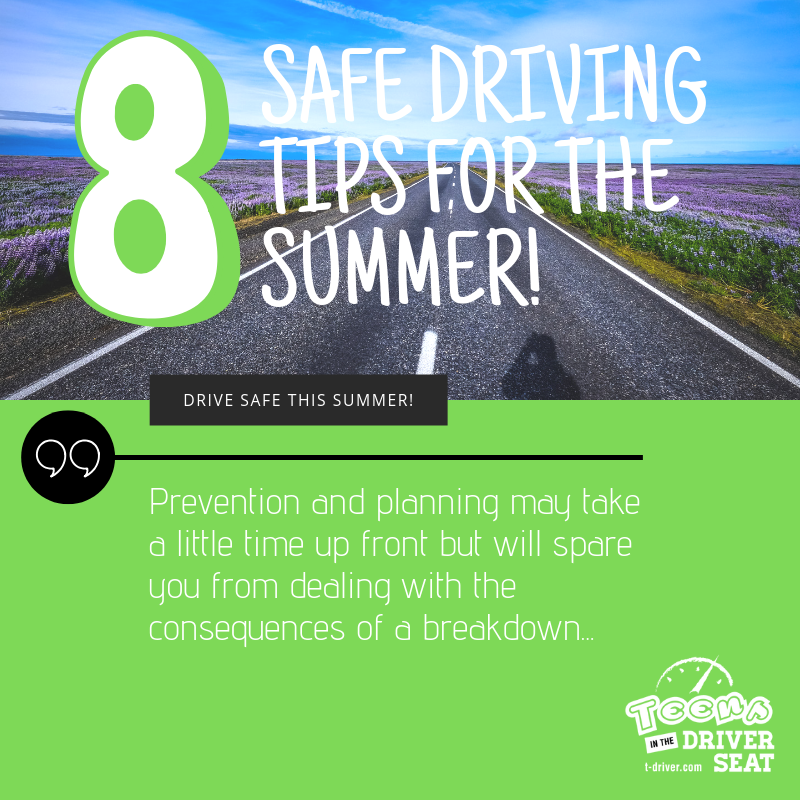“Prevention and planning may take a little time up front but will spare you from dealing with the consequences of a breakdown—or worse yet, a highway crash—later.”
For most of us, summer is here and basically in full effect! Our partners at National Highway Traffic Safety Administration (NHTSA) are great about publishing safe driving tips for summer every year. We think it is valuable information for new drivers as well as a good reminder for all of us as we head into summer travel.
Whether you plan to hit the road with your friends or family, we encourage you to remember all the risks you have learned about through Teens in the Driver Seat and practice safe driving by avoiding distracted, drunk and drowsy driving. Always wear your seat belts and never speed. But one of the best things you can do to ensure your road trip is a safe one, is to review these safety tips to make sure your vehicle is as ready as you are! Here’s an overview:
- Get your car serviced. When it comes to road trips, everyone is usually so excited about the trip and all the fun activities that lie ahead that they just throw their bags in the car and head out! However, taking the time to give your vehicle a check-up to make sure you’re up-to-date on regular maintenance such as tune-ups, oil changes, battery checks, and tire rotations can make the difference between a great vacation or one you can only hope to forget.
- Check for Recalls. Recalls are very important and easily overlooked. NHTSA’s VIN look-up tool lets you enter a Vehicle Identification Number (VIN) to quickly learn if a specific vehicle has not been repaired as part of a safety recall in the last 15 years. Check for recalls on your vehicle by searching now: NHTSA.gov/Recalls.
- Go over your vehicle safety checklist. Just like getting your car serviced, checking off these basics will help prevent mishaps that could really put a dent in your plans! This checklist includes tires, lights, cooling system, fluid levels, belts & hoses, wiper blades, a/c, and floor mats.
- Pack an Emergency Roadside Kit. When on a road trip, you either pack snacks or make a necessary pit-stop to load up on all your favorites, right? Well, why wouldn’t you do the same in case of an emergency? Make sure you pack things like jumper cables, phone chargers, batteries, flashlights, basic tools, a gas can, a tire jack, and a first aid kit. Honestly, these are all things you should probably just keep in your car daily…just to be on the safe side!
- Everyone should Buckle Up, Every Trip, Every Time. Be a responsible driver and/or passenger. Make sure EVERYONE is always buckled up properly, no matter where they are sitting, including children and their recommended car seats. Additionally, while it seems like fun, don’t place your feet on the dash or outside the window, as doing so will endanger you more if a crash occurs. Know how to wear a seat belt properly. It’s a super simple way to stay safe!
- While on the Road. Stay alert and share the road. Staying alert can be difficult, especially while driving for long periods of time. Make sure you’re allowing yourself to stop and rest. Plan to stop at rest stops or hotels in the evening for your own safety. If you are the passenger, help the driver out by keeping them company and helping watch the road. Staying the night in different places along the way can be a lot of fun!
- Avoid Risky Driving Behaviors. Of course, this is the tip we feel most strongly about. Distracted Driving, Impaired Driving and Speeding are all driving behaviors that can lead to trouble. You can read more about the driving risks on our website: https://www.t-driver.com/know-the-risks/high-school/
- Keep Kids Safe in and Around the Car. Never leave children alone in the car—not even for a few minutes or with the engine running. Vehicles heat up quickly; if the outside temperature is in the low 80s°, the temperature inside the vehicle can reach deadly levels in just a few minutes—even with a window rolled down. A child’s body temperature rises 3 to 5 times faster than that of an adult.
Before you back out of a driveway or parking spot, prevent back-overs by walking around your vehicle to check for children running and playing. (This is also a good time to check your tires for any visible punctures or nails.) When using a backup camera, remember that kids, pets and objects may still be out of view but in the path of your vehicle. When children play, they are often oblivious to cars and trucks around them.
Thanks to NHTSA for refreshing our minds with these summer safe driving tips. Most of the tips shared are practical and easy to follow so we hope that you keep them in mind this summer before you hit the road near or far!
